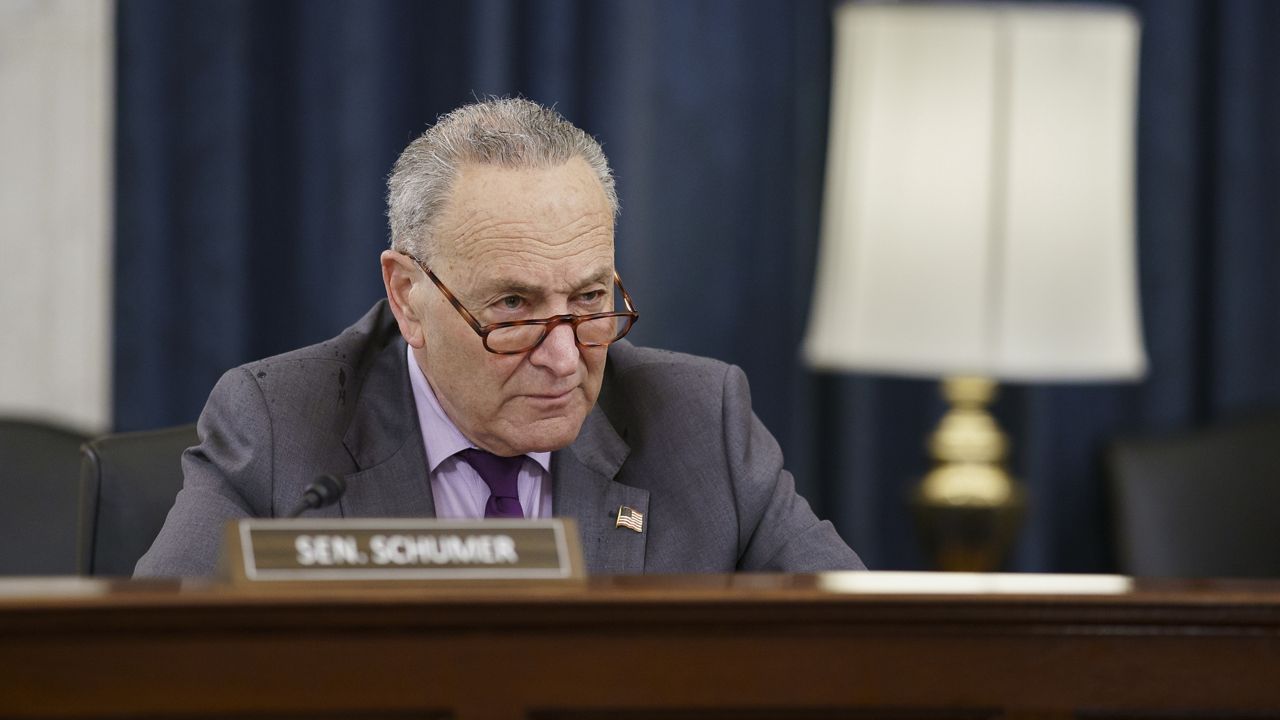The Senate held a hearing Wednesday to advance the “For the People Act,” the sweeping bill that would expand voting rights nationwide as Republicans in statehouses across the country attempt to restrict voting access.
The measure, which passed in the House earlier this month along party lines, is one of the Democrats’ top legislative priorities — and a top priority that Republicans, who call it a power grab, want to block.
The bill would make it easier to vote by allowing for widespread early voting and voting by mail, reform campaign finance, and put an end to partisan gerrymandering, and reform campaign finance laws.
Hearings such as the one being held by the Rules Committee Wednesday don’t often attract the leaders of the Senate — but both Senate Majority Leader Chuck Schumer (D-NY) and Minority Leader Mitch McConnell (R-KY) were in attendance, signaling just how important this bill is to both parties.
“Today, now, in the 21st century, there is a concerted, nationwide effort to limit the right of American citizens to vote and to truly have a voice in their own government,” Schumer said, before posing a question: “I would like to ask my Republican colleagues, Why are you so afraid of democracy?”
“Why, instead of trying to win voters over that you lost in the last election, are you trying to prevent them from voting?” Schumer asked, claiming that the restrictive laws being introduced by Republican-led statehouses “smack of Jim Crow.”
The majority leader slammed a proposed Arizona law that would require absentee ballots be notarized, asking how poor people would be able to afford a notary, and legislation in Georgia that would restrict early voting to Sundays, which critics say would negatively impact voters who attend “Souls to the Polls” events sponsored by black churches.
“It is shameful that our Republican colleagues are proposing these ideas in 2020,” he said. “Shame, shame, shame.”
McConnell countered, saying that Democrats are the ones who should be “ashamed” for some of the provisions in the bill, including one that would tweak the Federal Election Commission to an odd number to break deadlocks, which the Kentucky Republican said would turn the body into a “partisan prosecutor.”
“This is an attempt by one party to write the rules of our political system,” McConnell said. “We can’t afford to go further down this road.”
The bill passed in the house 220-210 earlier in March, with no Republican support. The bill has deeply divided the two parties in Congress.
Rules Committee Chair Amy Klobuchar (D-MN) said that the voting reforms in the bill “are not radical proposals. These are ideas that nearly everyone in this country agrees with,” but her GOP counterpart, ranking Rules Committee Republican Roy Blunt (R-MO), called the bill an “unprecedented power grab by the federal government” and would result in “an unmitigated disaster for our democracy.”
According to the Brennan Center for Justice, as of Feb. 19, 253 bills have been introduced to restrict voting access in 43 states, including reliably red states such as Texas, South Carolina, and Alabama — as well as battleground states like Pennsylvania, Georgia, and Arizona, which decisively swung the 2020 election for Joe Biden.
An analysis from The Washington Post suggests that the efforts to restrict access to the ballot box would be the most sweeping since the Reconstruction era.
Texas Sen. Ted Cruz falsely claimed that the bill would automatically register "millions of illegal aliens" to be able to vote – the bill has multiple provisions which state that people have to be citizens in order to vote.
The battle in Congress over the bill has also brought focus back to the filibuster — the 60 vote threshold required to pass major legislation in the Senate — which seems to come up in every debate over significant legislation, including a recent push for gun control.
"It is a contradiction to say we must protect minority rights in the Senate, while refusing to protect minority rights in the society,” Georgia Sen. Raphael Warnock said, blasting GOP-backed voting restrictions as “Jim Crow in new clothes” in a speech on the Senate floor last week. "No Senate rule should overrule the integrity of our democracy, and we must find a way to pass voting rights whether we get rid of the filibuster or not."
A 50-50 Senate would require 10 Democrats to support the measure to pass, seemingly an impossible task — and all 50 Democrats would need to agree to kill the filibuster, which is also somewhat unlikely, as a number of moderate Democrats, such as West Virginia’s Joe Manchin, have signaled an unwillingness to do so.
But at least one Senator has noted that they would be willing to support changing the filibuster rules if it means passing a measure to expand voting rights: Maine’s Sen. Angus King, an Independent who caucuses with the Democrats.
King wrote in an op-ed for The Washington Post that “all-out opposition to reasonable voting rights protections cannot be enabled by the filibuster.”
“If forced to choose between a Senate rule and democracy itself, I know where I will come down,” King added.



